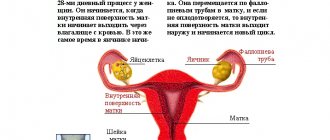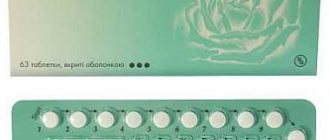The in vitro fertilization protocol is a complex set of sequential measures that entails changes in the reproductive and endocrine system. As a result, women find themselves at a loss and ask questions: “when do menstruation come after IVF,” “when do menstruation come after an unsuccessful IVF,” and others. In order for a woman to be in a favorable psycho-emotional state, we will now explain everything when there is a delay in menstruation after IVF, as well as what nature they have in the case when menstruation came after an unsuccessful attempt at IVF after replantation.
The menstrual cycle is a sequence of cyclic changes that take place at all levels of regulation of the reproductive system, from the cerebral cortex to the endometrium and all target cells for hormones of the reproductive system. It has been proven that the more stable and regular the ovarian-menstrual cycle, the more stable the reproductive system functions. Changes in the nature of the menstrual cycle before and after the use of assisted reproductive technologies can indicate a variety of conditions in a woman.
Why you can’t have periods during early pregnancy
In fact, you never get your period during pregnancy.
This process is incompatible with pregnancy itself. Menstruation is the process of shedding the functional layer of the endometrium. It may be accompanied by bleeding from the genital tract. However, due to certain circumstances, there may not be blood. The endometrium has two layers: functional and basal. Basal – located deeper. A functional layer grows from it every month. It has a thickness of up to one and a half centimeters. Why is it needed, this functional layer? It is necessary so that if the egg is fertilized, it can sink into the endometrium and develop further there. This is how pregnancy occurs. If the functional layer remains unclaimed (pregnancy does not occur), then at the end of the month it is rejected. This is menstruation.
So why can’t you have periods during early pregnancy? Because if the functional layer of the endometrium were rejected, the embryo would come out of the uterus.
If you get pregnant, and after 2 weeks you get your period, then you will never know about your pregnancy, since it was interrupted very early. Such a pregnancy is called biochemical - it can be “caught” only with the help of blood tests, but cannot be diagnosed clinically. Such cases are usually associated with genetic or chromosomal abnormalities that block the development of the embryo in the earliest stages.
There is no menstrual cycle in subsequent months. Accordingly, menstruation cannot occur during pregnancy. Why is there no cycle? From a common sense point of view: because you are pregnant, which means that there is no point in the body taking action to get you pregnant - the goal has already been achieved. From a physiological point of view: because a huge amount of hormones are produced that block ovulatory processes and prevent the functional layer of the endometrium from being rejected.
And if there are not enough hormones, will menstruation come in this case? Unfortunately yes. In this case, the pregnancy will be lost. This phenomenon is called luteal phase deficiency of the cycle. It is one of the most common causes of infertility and recurrent miscarriage. If your doctor suspects that you are lacking your own hormones, he will definitely prescribe them to you in the form of oral or vaginal tablets.
Hormonal imbalances
Normally, after fertilization, a woman’s body receives information about conception and begins to rebuild. The hormonal background changes, the level of progesterone increases, which prevents the mucous membrane from peeling off and being excreted with the blood from the body, that is, there are no periods during pregnancy.
Sometimes during implantation of the fertilized egg, this occurs 7-10 days after ovulation, you may notice light, bloody discharge. The same discharge may appear on the days when menstruation was supposed to occur, but it differs sharply from normal menstruation. During menstruation, endometrial detachment causes bleeding of at least 80 ml, and there is little bleeding during implantation or on the day when menstruation was supposed to begin. Moreover, this indicates hormonal imbalance or other problems.
Pathological causes
If the test is positive, there are symptoms of early toxicosis, a delay, then the appearance of discharge should immediately alert the woman. This may be the first sign of spontaneous abortion or a woman having diseases of the reproductive organs.
So, menstruation during pregnancy can occur with:
- hormonal disorders;
- infectious, inflammatory diseases;
- early miscarriage;
- fibroids;
- anatomical pathologies of the uterus;
- ectopic pregnancy.
Any of these reasons requires the intervention of a doctor, as it can lead to complications, miscarriage, or ectopic pregnancy. During a miscarriage, the pain can be severe, cramping, the discharge is copious and scarlet. With ectopic pain, it occurs on one side, drawing, and scanty discharge.
Bloody discharge also occurs with myomatous changes in the uterus, which can lead to spontaneous abortion. Of course, in some cases, pregnancy can continue, and the woman will carry and give birth to a child, but in such cases, strict monitoring by an obstetrician-gynecologist is required.
Menstruation after follicular puncture without transfer
Patients are not always sent for IVF immediately after oocyte collection. Even without the fertilization procedure, there is a risk of disruptions; the regularity of menstruation may be disrupted.
The state of health during menstruation after follicular puncture may worsen; women complain of the following symptoms:
- pain that is not relieved by taking painkillers;
- decreased blood pressure;
- hyperthermia;
- the appearance of vaginal discharge with an unpleasant odor;
- vomit.
Important! If you lose consciousness or experience one of these symptoms, the patient needs urgent medical attention.
If a woman feels unwell during her period after a puncture, and the pain goes away after taking non-steroidal anti-inflammatory drugs, then there is no cause for concern. A slight deterioration in well-being may be due to the body’s reaction to the intervention.
How long after puncture does menstruation begin?
Normally, after oocyte collection, menstruation should begin 10-14 days later. Mechanical collection of follicles is a replacement for ovulation, which should occur. After the procedure, phase 2 begins. Its duration should not differ from the standard one.
Delayed menstruation after follicular puncture
Before egg retrieval, the woman is prescribed medications to stimulate the ovaries. Under their influence, several eggs mature in them. In place of each of them, a corpus luteum is formed, synthesizing the hormone progesterone. Due to its increased amount in the body, the duration of phase 2 may be extended. A delay of 5-7 days is considered acceptable.
If there is no menstruation for more than a week, then you need to see a doctor. There is a risk of cystic formations on the ovaries or hormonal imbalance. In cases where IVF is not planned after the puncture, hormonal contraceptives may be prescribed to prevent problems.
Why can menstruation be delayed?
Often, the reason for delays is the woman’s psychological mood. If artificial insemination is unsuccessful, then in most cases mothers experience stress. Sometimes a depressive state appears. If the hormonal background has changed, then this condition can greatly influence the appearance of menstruation; in this case, it is impossible to predict when they will appear - it all depends on the female body.
The other side of this issue is the situation when your period came almost on time. But after them, the next ones are able to somehow be delayed, again, the menstrual cycle is irregular. It takes some time for it to normalize. The period can be long and sometimes shorter.
There are situations when women did not get their periods after unsuccessful IVF for about a year or more. There are rare cases when doctors have to use special medications to artificially induce menstruation.
Reasons for delay in case of negative fertilization outcome
The main reason is always stress and psychological tension. Many women become depressed after receiving a negative hCG test result. This further disrupts the hormonal system. Constant nerves and tears do not allow the body to balance and begin to function normally.
Important! Doctors should be contacted if more than 10 days have passed since a negative hCG test, which confirmed that the IVF procedure was unsuccessful and menstruation has not started.
There are cases when the first menstruation comes on time without significant delays, but later cycle disruptions appear. This is also quite common. The cycle after unsuccessful IVF can take from 3 to 6 months to recover. In some cases, it may take a year to restore it.
In very rare cases, doctors induce menstruation with medication. This is only permissible under medical supervision; self-administration of potent hormonal drugs is life-threatening.
After unsuccessful IVF, some women experience pronounced premenstrual syndrome, which manifests itself in the form of nausea, dizziness, headache, and nagging pain in the lower abdomen. Many begin to think that these are symptoms of early pregnancy. But it’s too early to draw conclusions before testing for hCG.
You cannot “prescribe” yourself any medications to “support” pregnancy. This is a serious interference in the functioning of the endocrine system, which can lead to both a pregnancy failure (if there really was one) and an even longer delay in menstruation.
What signs indicate that pregnancy has occurred?
Signs after embryo transfer are not much different from natural pregnancy. Possible appearance:
- nagging pain in the lower abdomen and lower back;
- insomnia;
- weakness and drowsiness;
- swelling of the mammary glands;
- increased sensitivity;
- high temperature;
- causeless irritability, tearfulness, touchiness.
Symptoms only indicate pregnancy, intolerance to certain odors. Taste sensations change, nausea appears in the morning. Although these symptoms are indirect, and of course, they can be compared with premenstrual syndrome in women. When your period appears after embryo transfer, you can use a test strip that can be purchased at a pharmacy, but of course, it will not give 100% certainty about the onset of pregnancy. It is possible to conclude that the pregnancy is 100% successful only after taking an hCG test.
USEFUL INFORMATION: Diferelin: treatment of female infertility
With eco-implantation, implantation can occur quite late, only on the 8th day, so spotting bleeding comparable to menstruation may well appear. But it's not the same thing. Implantation bleeding is light, faster, and somewhat different from normal periods.
The appearance of menstruation on the 10th day may indicate:
- miscarriage;
- injury to the area of the uterus after taking a puncture;
- hyperstimulation syndrome while taking hormonal drugs (Utrozhestan, Duphaston), when the sex glands have to work harder, and women experience excessive overstimulation.
In addition, women’s perception of IVF as a failed attempt can provoke a hormonal surge in the body, leading to irritation of nerve fibers in the pelvic area, discomfort and enlargement of the uterus, and ultimately to bleeding.
After IVF, it is no exception if menstruation appears after embryo transfer. If the egg is not fertilized or if there is an ectopic pregnancy, strong discharge with blood clots will appear from the genital tract. In such cases, you need to consult a doctor. Maybe there is still a chance of continuing the pregnancy.
If the embryo managed to survive and it implanted after replanting, then on the 10th day you can check the onset of pregnancy with a home test. By this time, as a rule, the level of hCG is already noticeably increased. If everything is normal, then the woman, as in a normal pregnancy, will undergo an ultrasound on day 21 to monitor the presentation and formation of the fetus.
Of course, the absence of menstruation is the first sign that everything went well. But even in the absence of pregnancy, menstruation may not occur due to hormonal imbalance, experienced unrest and surgical procedures carried out at the time of embryo placement.
After an unsuccessful attempt at IVF, your period may be delayed for 2-3 weeks, although most women say that they begin on time. The arrival of menstruation exactly on time only indicates the well-coordinated work of the reproductive system and the high probability that the next attempt at IVF will most likely be successful.
WHAT TO DO IF YOU HAVE A FIBROID, CYST, INFERTILITY OR OTHER DISEASE?
- You are experiencing sudden abdominal pain.
- And I’m already quite tired of long, chaotic and painful periods.
- You do not have enough endometrium to become pregnant.
- Discharge that is brown, green or yellow.
- And for some reason the recommended medications are not effective in your case.
- In addition, constant weakness and ailments have already become a firm part of your life.
What to do if you have menstrual irregularities
So, you already know what it means when your menstrual cycle goes wrong, the reasons for this phenomenon, and now you need to figure out how to eliminate all this. Of course, first of all you need a consultation with a gynecologist and a full examination. Sometimes without them it is simply impossible to accurately and correctly diagnose the cause of menstrual irregularities. After the initial consultation, you may be prescribed the following tests and examinations:
- Vaginal smear
- Pelvic ultrasound
- Blood test for hormone levels
- Possibly MRI
- Urinalysis and so on.
Remember that the failure of the menstrual cycle itself cannot be treated - in order to stabilize the functioning of the reproductive system, it is necessary to eliminate the pathology that led to it. Sometimes treatment can even be surgical, and not just medication. After receiving the results of the tests, the doctor may prescribe the use of hormonal, homeopathic, hemostatic drugs, antibiotics and other remedies. Antibacterial therapy is also possible.
It is also worth being aware that phytoestrogens have a more gentle effect on the female body than other options.
When taking certain hormonal medications, be sure to pay attention to the active substance and the content of phytoestrogen
It may also be that the gynecologist will not detect any disturbances in the functioning of the woman’s reproductive system. In this case, it would be advisable to refer to an endocrinologist or immunologist for additional examination, because the reasons for the failure of the menstrual cycle may insidiously be hidden in the incorrect functioning of the thyroid gland or even the adrenal glands.
Transfer
Couples decide to artificially conceive a baby if a woman cannot get pregnant on her own. Perhaps, with natural conception, women do not expect delays like that.
Attention! Menstruation will begin in any situation; after unsuccessful embryo transfer, delays are possible. It's not scary
Of course, the process of artificial insemination causes changes at the hormonal level. Large doses of medications lead to temporary disturbances and are reflected in the timing and nature of the course of critical days.
It is difficult to say when periods begin after discontinuation of IVF support. The body is a unique system. A woman of reproductive age should understand that such moments are purely individual. The cycle after IVF will gradually recover, it will be regular or with periodic delays, it all depends on the general condition of the expectant mother. Painful periods after unsuccessful IVF appear after 3-5 days of interrupting the use of medications.
Discharge after in vitro fertilization is considered the result of a restructuring of the hormonal balance. When menstruation begins, everything is restored on its own; slight brown or pink discharge is a normal condition for a woman.
Smearing means normalization of hormonal levels; it should not bother you. Minor discharge passes without pain and deterioration of the general condition.
Character
If IVF doesn't work out, when will your period come?
The process of bleeding is individual. It is difficult to name specific dates for the onset of menstruation.
Judging by the reviews of patients who have undergone extracorporeal conception, after unsuccessful IVF the cycle changes, full-fledged bleeding begins from 5 to 12 days.
From day 3, ladies notice brown discharge on their underwear. They can last several days - from 2 to 5.
When do periods start as usual after unsuccessful IVF? This is not exactly a joyful event; the main thing is to react correctly. When menstruation begins after IVF, you should immediately inform your doctor, as uterine bleeding may occur.
Full discharge will begin in any case. After IVF, heavy periods appear on days 5–12, immediately after the spotting stops. The first discharge of blood must be experienced without drawing conclusions; it will be unusual. Menstruation in the 2nd menstrual cycle will occur within the usual parameters.
Further course
If after unsuccessful IVF there are no periods in the 2nd cycle, there is no need to worry. This period is called rehabilitation; the functioning of the organs responsible for the production of reproductive cells and hormones is restored.
A delay in menstruation after unsuccessful IVF in the next cycle does not mean a poor state of the endocrine system or organs that ensure sexual reproduction of the body. If bleeding has not started after 10 days, you must make an appointment with your doctor.
Delayed menstruation is the result of stress and prolonged depression. Nervous system disorders cause prolonged absence of monthly bleeding. A woman should visit a psychotherapist and undergo a rehabilitation course. You can then consider running a repeat protocol.
After IVF, cycle failure is normal. The main thing is to be able to survive this period and recover. If there are no periods after IVF in the second cycle for too long, doctors suggest inducing menstruation with special medications.
USEFUL INFORMATION: How can you lower progesterone if it is in excess?
How do menstruation end during menopause?
Those representatives of the fairer sex who will soon experience menopause are always interested in knowing how menstruation disappears forever. How long the premenopausal period will last cannot be answered by even the most highly qualified doctor, since each woman’s body is unique.
The first sign of the beginning of the decline of ovarian function is the prolongation of the intervals between monthly bleedings. Usually, at first, the period between menstruation stretches for a week, then extends to a month, etc. Over time, spotting becomes more scanty, and eventually it disappears completely.
Sometimes women do not want menopause to occur and turn to their doctor for advice on how to delay the onset of this period. The same problem can arise among those representatives of the fair sex whose menopause began too early. In such cases, the doctor may recommend taking the following menstrual return medications:
- vitamin preparations to stimulate ovarian activity;
- Dietary supplements to increase the level of estrogen in the blood;
- hormonal preparations based on estrogen.
Which therapy method will be most effective and what the doctor recommends depends on the health status of each individual woman. That is why you cannot self-medicate in such cases - drugs chosen independently can either be useless or have a negative effect on the body.
Changes in the monthly cycle and the nature of menstrual bleeding appear in each representative of the fair sex at their own time and occur differently. The main tasks in premenopause are to determine, together with the treating gynecologist, whether the bleeding is normal, whether the woman has any genital disease and whether she needs treatment. Any changes in the cycle during this period of life should be a reason to consult a doctor. In addition, a woman should not be upset about the onset of menopause and understand that this process is natural and physiological. Its negative manifestations in the form of hot flashes, mood swings and other unpleasant symptoms can be effectively eliminated using conservative methods or drug therapy.
Why does bleeding occur?
After embryo transfer, bleeding may well begin, and this does not mean that menstruation is the reason for the embryo’s failure to survive. It happens that a woman has overworked herself, which should not be allowed during replanting and she needs to be careful. Or the reason lies in the lack of progesterone or other hormones in the body. Of course, the risk of miscarriage is huge. If there are:
- heavy bleeding;
- heaviness in the stomach;
- if you feel pressure in the lower abdomen, as during menstruation, it is better to consult a doctor.
Although the symptoms should not cause panic, since the uterine cavity after the manipulations of doctors can be injured and any improper movement of the woman, namely lifting weights, excessive zeal can lead to painful sensations in the lower abdomen and minor bruising.
This is the norm. This condition can last up to 12-14 weeks, and there is no need to worry about it. In order to be sure whether pregnancy has occurred or IVF has not worked, it is necessary to take a blood test for hCG on an empty stomach. A regular pregnancy test from a pharmacy can be erroneous.
It is normal even when bleeding occurs in the first 2–3 months after embryo transfer, but the lower abdomen should not hurt, and only moderate discharge is acceptable. On the other hand, an attempt to get pregnant may be unsuccessful when menstruation begins on the 7th–8th day after embryo transfer and the reasons for this are:
- development of the inflammatory process in the cervix;
- reduced quantity and quality of sperm and eggs;
- the presence of bad habits in a woman after embryo transfer, drinking alcohol, smoking, and a sedentary lifestyle;
- genetic incompatibility when taking biomaterial from partners;
- severe growth of the endometrium outside the uterus;
- the presence of low quality blastocysts or genetic defects.
Reasons for the “jumping” cycle: menstruation failure is dangerous
Physiological causes of menstrual irregularities
Physiological causes are the least dangerous and are easier to eliminate than others. These include:
- stress and nervous tension, lack of sleep, chronic fatigue;
- severe physical overload;
- body weight disorders (obesity and wasting);
- sudden climate change;
- activation or lack of sexual activity;
- strict diets, consumption of alcohol, tobacco, drugs, excessive caffeine consumption;
- postpartum period and lactation period;
- various cleanings, scrapings;
- radiation and poisoning.
Violation of body weight can lead not only to cycle failure, but even to its temporary absence. This occurs due to the production of the male hormone androgen in adipose tissue, and the more this tissue, the more hormone is released.
Pathological causes of problems with menstruation: urgently see a gynecologist!
Pathological causes are more dangerous and can lead to serious complications if not diagnosed and treated in a timely manner. These include the following main diseases:
- tumor and polypous formations, various “omas” - for example, uterine fibroids, which disrupt the proper functioning of the reproductive system;
- ovarian pathologies (cyst, polycystic disease, dysfunction);
- infectious and inflammatory processes in the genital area;
- endometriosis of the uterus;
- endometrial hyperplasia;
- thyroid diseases;
- other diseases of the “non-sexual” area that cause hormonal imbalance (blood diseases, diabetes, etc.);
- hereditary predisposition.
The range of such provoking diseases is wide: from mild colds of the genital organs to oncology. This can also include frozen pregnancy, miscarriage and complications after an abortion. Often the pathology is asymptomatic, the general condition is satisfactory, but the menstrual cycle is irregular. In this case, a special examination will be required to confirm or refute the presence of pathology.
Medicinal causes of menstrual irregularities
Medicinal causes include taking medications. Almost any medicine that enters the body affects all organs and systems, especially the reproductive one. The following drugs can disrupt the cycle:
- Antidepressants – cause a delay in menstruation and reduce the amount of discharge;
- Anticoagulants and blood thinners – increase the intensity of bleeding;
- oral contraceptives - long-term use of hormonal drugs shortens the duration of menstruation and makes them scanty, and the wrong choice can radically change the cycle. Cancellation of oral contraceptives often also leads to disruption of the cycle, but this does not pose a danger to the body. Full recovery in such cases occurs after 2–3 months of the cycle;
- Hemostatic drugs - reduce the amount of discharge;
- Antiulcer drugs – cause a delay in menstruation;
- Intrauterine device - the body perceives its installation as a stressful situation, so even if it is performed correctly, minor cycle disruptions occur.
Incorrect placement of the intrauterine device or illiterate installation often provokes uterine bleeding or serious cycle disorders. Normally, its stabilization should occur within 3–4 cycles.
What day do you have your period after embryo transfer?
As a rule, menstruation occurs on the 6th day. When they appear, an attempt at in vitro fertilization, again, cannot always be considered unsuccessful. Eco is a rather complex procedure and many factors must be taken into account. Not many women manage to get pregnant on the first try, but you shouldn’t despair. If the discharge is pink and not abundant, then most likely it is implantation bleeding, which means everything worked out. This only indicates the successful implantation and attachment of the fertilized egg to the walls of the uterus. When bleeding, women feel weak and feel some discomfort and this is normal.
But menstruation can also begin with a hormonal imbalance in the body, so it is important for a woman to remain under the supervision of a doctor even after the IVF procedure. Special medications may be prescribed to achieve balance and the required levels of progesterone and estradiol
It happens that spotting appears due to this imbalance and an urgent adjustment of the dosage of medications is necessary. Nevertheless, often the appearance of menstruation indicates rejection of the fertilized egg, when it is no longer possible to do without urgent hospitalization of the woman in order to maintain the ongoing pregnancy and retain the embryo in the uterine cavity.
When to expect your period after IVF
Even the best reproductologist cannot determine exactly how many days after IVF support is discontinued, menstruation begins. For each patient, these periods are purely individual. In most situations, 3-5 days should pass from the moment the hCG test results are negative before the start of menstruation.
The time period should be counted not from the moment of the in vitro fertilization procedure, but from the moment the maintenance therapy is discontinued. And a woman stops taking hormones immediately as soon as a test for human chorionic gonadotropin rules out pregnancy.
Deviations from this indicator are possible, which is also not a pathology. The speed of recovery of the menstrual cycle will be influenced by the following factors:
- patient's age;
- hormonal status before IVF;
- type of fertilization protocol;
- presence/absence of ovarian stimulation;
- total amount of hormonal drugs;
- the nature of the usual cycle;
- presence/absence of cycle disorders in the past;
- general health of women;
- psycho-emotional state.
If you count the period immediately after embryo transfer, then women’s reviews of menstruation are within 3-15 days. It is not at all necessary that bleeding will begin within these days. It is also necessary to take into account the negative emotional background that develops in women who want to quickly feel the fetus inside themselves.
Probability of success
Problems in diagnosing IVF results are associated with bloody discharge, which after embryo transfer can mean both menstruation and implantation bleeding. Therefore, you should not panic and immediately think about the failed procedure.
The attachment of the fertilized egg to the endometrium of the uterus is indicated by the appearance of discharge with the following characteristics:
- Same amount of blood all days.
- The duration of the discharge is only a few days.
- Presence of scanty spotting discharge.
- There is pain, but only a little tugging in the lower abdomen.
- Designation of discharge with bloody streaks in the mucus.
If your stomach hurts after embryo transfer, as during menstruation, pregnancy cannot be ruled out. But it won't hurt to go to the doctor. If a pulling sensation occurs, then there is a chance of successful implantation of the egg. But if the pain is cutting or stabbing, then this may be a harbinger of menstruation. But only a reproductive specialist can say for sure about the situation.
Additional symptoms
Menstruation after IVF always means failure. But before them, symptoms that resemble early pregnancy may occur:
- breast enlargement and tenderness;
- slight nausea;
- change in taste preferences;
- drinking large amounts of liquid;
- sudden mood swings;
- constant fatigue and drowsiness;
- increased irritability.
Therefore, experts advise women to remain calm and not to assume a successful result ahead of time. Otherwise, after a negative test, your emotional well-being and hope for a future pregnancy may suffer greatly.
Accounting for IVF type
Menstruation that begins after unsuccessful IVF also determines the type of specific protocol:
- long;
- hyperlong;
- ultra-short;
- short;
- Japanese;
- against the background of the natural cycle.
With a long and hyper-long protocol, due to the large number of hormonal agents, delays and slow restoration of the functioning of the genital organs without regulation are most often likely.
With a short or ultra-short fertilization program, the likelihood of ovarian hyperstimulation syndrome is least likely.
The body returns to normal most quickly after the Japanese protocol and manipulations during the natural cycle.
In the first case, minimal doses of HRT are used, which virtually eliminates negative consequences. In the latter case, additional drugs are not used; sometimes the embryologist prescribes ovarian stimulation.
Each type of protocol is suitable in certain situations. Therefore, one cannot insist on a short or Japanese protocol for fear of atypical menstruation after embryo transfer. After all, if you have endometriosis, fibroids or excess weight, only a long fertilization program is suitable.
IVF protocols
The long IVF protocol begins in the second phase of the cycle, around day 21 or 22. First, therapy occurs using Diferelin or Decapeptyl. After menstruation begins, stimulant medications are used on the second or third day, which include:
- Puregon;
- Menopur;
- Gonal-F.
The duration of their administration is about 12 days, but in some cases it can be longer, subject to monitoring the condition of the ovaries and uterine epithelium using ultrasound.
The super-long protocol is similar in its scheme to the long stimulation scheme. An important difference is the use of Diferelin and Decapeptyl in depot form, which means its administration once every 4 weeks. The maximum number of injections is 6 pieces. This scheme helps to reduce endometrioid cysts that were previously punctured. Immediately after the first improvements appear, the doctor prescribes medications for stimulation.
Embryo transfer
Usually, the most complete and healthy embryos are used for transplantation, although their survival rate does not exceed 40%. The use of 5-day-old embryos is considered favorable; in this case, you can count on pregnancy in 50% of cases. It is not always possible to preserve the embryo in an artificial test tube environment for 5 days, so it is more popular to use it at 3 days of age. The embryos are transferred into the uterine cavity through the cervical canal using a catheter. After the procedure, you may experience the following symptoms:
- Pain in the lower abdomen and a feeling of tightness, especially in those women whose periods are painful. In no case should you endure pain after embryo transfer, since this condition threatens the development of uterine hypertonicity, as a result of which the embryo will not be able to attach to its mucosa and pregnancy will not occur. To prevent such a situation, it is necessary to use drugs that relieve pain, such as no-spa or papaverine.
- Increase in body temperature after the end of the embryo transfer process.
USEFUL INFORMATION: Twins after IVF
Spotting in the first days after IVF
Still, when deciding to undergo IVF, women have to face many difficulties. A lot of time is devoted to preparing for the procedure and carrying out treatment. The hormonal background is unstable and synthetic substances, when entering the body, can, of course, lead to cycle failure. Although, when menstruation appears before embryo transfer, the procedure should be postponed, since the endometrium must return to normal, that is, be loose and quite thick in order for the embryo to attach well. A woman should gain strength and patience before a long and not always justifiable procedure.
Discomfort and the appearance of menstruation often occurs 7–8 days after embryo transfer. But it’s too early to panic. Smearing like this does not always mean lack of success. Doctors recommend listening to your body in the first days after IVF and, of course, in addition to believing in luck, not overloading yourself with physical work, resting more, and putting sex life aside for a while.
How is an intrauterine device installed?
contraceptive
- gynecological examination and palpation (palpation) of the mammary glands;
- vaginal smear, if necessary, culture for microflora;
- cytological examination of smears from the cervix;
- Ultrasound of the pelvic organs;
- in some cases, a pregnancy test or blood test to determine hCG levels;
- Ultrasound of the mammary glands (for women under 40 years of age) or mammography (after 40 years of age).
After installation of the intrauterine device
Ultrasound photo:
- The uterus completely gets used to the IUD within several months, so during this period some changes in women’s health may be observed; you need to listen to your body.
- In some cases, a course of antibacterial therapy will be required after insertion of the IUD, for example, if chlamydia is suspected or if there is another chronic infection of the genitourinary system.
- Bloody spotting and nagging pain in the lower abdomen or back may bother you for 1 week after insertion of the IUD. To relieve spasms, you can take No-shpa.
- The hygiene regime is normal; you need to wash yourself with intimate hygiene products twice a day.
- You can have sex only 8-10 days after the installation of the intrauterine device.
- For several months, you should not lift weights, engage in intense physical activity, or overheat (sauna, bathhouse, hot baths).
- It is necessary to periodically probe the spiral threads, control their length, it should not change.
- After 2 weeks, it is better to visit a gynecologist to see if everything is normal.
- Menstruation in the first months after installation of the IUD may be painful and heavy. Over time, menstruation normalizes.
- When using hormonal intrauterine systems, after six months or several years, menstruation may disappear (amenorrhea). After the first loss of a cycle, it is necessary to exclude pregnancy. The menstrual cycle will be restored immediately after the IUD is removed.
- If you have any complaints, you should consult a doctor.
- In the future, examination by a gynecologist is necessary every 6-12 months, as for any healthy woman.
How long does it take to use an intrauterine device?
- Inert IUDs are usually installed for 2-3 years.
- Copper spirals – up to 5 years.
- Copper spirals with silver and gold - 7-10 years or more.
- Hormonal intrauterine systems – up to 5 years.
Internet Ambulance Medical portal
During the day, 23 questions were added, 46 answers were written, of which 7 answers from 8 specialists in 3 conferences.
Complaint rating
- Blood test1455
- Pregnancy1368
- Cancer786
- Urinalysis644
- Diabetes590
- Liver533
- Iron529
- Gastritis481
- Cortisol474
- Diabetes 446
- Psychiatrist445
- Tumor432
- Ferritin418
- Allergy403
- Blood sugar395
- Anxiety388
- Rash387
- Oncology379
- Hepatitis364
- Slime350
Drug rating
- Paracetamol382
- Euthyrox202
- L-Thyroxine186
- Duphaston176
- Progesterone168
- Motilium162
- Glucose-E160
- Glucose160
- L-Ven155
- Glycine150
- Caffeine150
- Adrenaline148
- Pantogam147
- Cerucal143
- Ceftriaxone142
- Mezaton139
- Dopamine137
- Mexidol136
- Caffeine-sodium benzoate135
- Sodium benzoate135
Ultrasound for diagnosing pregnancy
In modern ultrasound diagnostic methods, doctors take into account the level of hCG in the blood serum to diagnose pregnancy. A fertilized egg can be detected only when the hCG level is not lower than 1000-2000 mU/ml; accordingly, it is recommended to perform an ultrasound when the hCG level is at least 2000 mU/ml, which corresponds to 21-22 days of pregnancy
Ultrasound at such an early stage is very important in terms of diagnosing multiple and ectopic pregnancies. Ectopic tubal pregnancy after IVF can occur in 2-3% of pregnancies
To diagnose pregnancy, it is advisable to use several diagnostic methods.
Reasons for missed periods after IVF
Sometimes after IVF there are no periods for a long time, but this is not associated with pregnancy. Menstruation may not begin for a long period due to the following reasons:
- severe stress after an unsuccessful procedure;
- development of depression against the background of unsuccessful IVF;
- long-term recovery of the reproductive system after hormonal therapy;
- ectopic pregnancy.
Severe emotional shock and depression increase the secretion of the stress hormone cortisol by the adrenal cortex, which negatively affects the functioning of many body systems, especially reproductive. A woman should understand that IVF may not work out the first time, and she should not be upset, because in the future this will lead to health problems and will significantly reduce success in subsequent attempts to get pregnant.
Sometimes hormonal therapy is too much of a shock for the body, so it can take up to a year to restore a normal menstrual cycle. In such cases, a woman must take all actions to normalize the functioning of the reproductive system (they will be discussed below).
The last factor due to which menstruation does not begin is an ectopic pregnancy. Is it possible to check it using tests? During ectopic implantation of the egg, hCG does not increase to the same extent, since a significant part of this hormone is synthesized by the endometrium after implantation of the egg. Therefore, if the hCG analysis shows no pregnancy, and menstruation does not start within 3-4 months, it is necessary to undergo additional examination, including a pelvic ultrasound and a blood test for hormones.
How to get your period back after losing weight?
The absence of menstruation in women over the age of 45 is considered normal, since this occurs as a result of menopause. But if you are 18-45 years old and have a similar problem, then you should immediately consult a doctor.
Do not restore your period on your own. This should be done by a specialist, since treatment often requires taking hormonal medications.
So, there are a few steps to getting your periods back.
Step 1. Visit a gynecologist. The doctor must conduct a thorough examination and accurately determine the cause of the absence of menstruation. Diet is not the only cause of this problem. The reason may also be:
- stress;
- disease of internal organs;
- heavy physical activity;
- menopause;
- disruptions in the body's metabolic processes, etc.
The gynecologist will prescribe you a course of necessary medications and monitor your health until complete recovery.
Don't be afraid to take hormonal medications. Some modern drugs do not cause weight gain. Even if you gain a few extra pounds, you can lose them with the help of a balanced diet and exercise within a month. In any case, women's health is more important than a slim figure.
Step 2. Balanced nutrition. In order to get your period back after a diet, you need to adjust your diet. It should be varied and balanced. Keep a food diary. This will help you monitor your diet more carefully and correct dietary mistakes. Write down everything you eat during the day, count calories and nutrients:
- Calories. The norm is 2200 kcal per day. But this figure depends on your physique and lifestyle. If you play sports or do heavy physical labor, then you need to eat about 2500 kcal. If you lead a predominantly sedentary lifestyle, then 1800-2000 kcal will be quite enough.
- Squirrels. The recommended protein intake is 1.5 g of protein per 1 kg of weight. For example, if a girl weighs 60 kg and leads an active lifestyle, then the norm for her would be 80-90 g of protein per day. Proteins are found in foods such as chicken, fish, eggs, dairy products, legumes, and buckwheat.
- Fats. They are the main nutritional element that regulates the functioning of the ovaries and pelvic organs. The norm is 1.5 g per 1 kg of weight. A girl who weighs 60 kg needs to consume 90 g of fat per day. The ideal option would be if 60 g are in animal fats (fish, beef, chicken, fish, egg yolks) and 30 g in vegetable fats (seeds, olive and other vegetable oils, nuts).
- Carbohydrates. There should be 4 g of carbohydrates per 1 kg of weight: for 60 kg of weight, 240 g of carbohydrates per day is enough. Do not abuse fast carbohydrates: cakes, pastries, white bread, sweets. They should not exceed 10% of your daily diet. Lean on slow carbohydrates that will give you energy for the whole day: cereals, durum pasta, rye bread, etc.
- Vitamins. Don't forget about vegetables and fruits. They should make up 30% of the daily diet. Forget about unhealthy snacks on the go and grab an apple or banana with you. Vegetables and fruits also contain fiber, which has a beneficial effect on the digestion process.
Step 3. Traditional medicine methods. Another remedy for restoring menstruation after a diet is folk recipes. But it is impossible to give a 100% guarantee of the effectiveness of these methods. You can turn to them if you are afraid to go to the doctor or traditional treatment does not help you. Recipes:
- Pour boiling water over 1 tablespoon of oregano herb and leave for 40 minutes. The infusion should be taken one glass 3 times a day.
- Drink lemon balm tea 2 times a day.
- Pour 1 tablespoon of mint, valerian and chamomile into 600 ml of boiling water and leave. Drink 100 ml before each meal (3-4 times a day).
- An excellent remedy for restoring the menstrual cycle is parsley. You can brew an infusion, and also eat it fresh.
Pain during discharge
The occurrence of painful periods after IVF is not a sign of a disorder. On forums, almost a third of women who had an embryo implanted describe similar symptoms. In each individual case, pain has different characteristics.
The main reason is stress. A patient who wants to have a child begins to worry after an unsuccessful attempt. And if menstruation has arrived, then there is no hope for implantation this month. This fact affects sensitivity, so pain can become even more intense.
Also, do not forget that it is not enough to simply cancel HRT. A specially prepared layer of the uterine mucosa for the attachment of the fertilized egg not only causes heavy discharge, but also provokes more severe discomfort during menstruation.
Other unpleasant sensations may be associated with pathologies. This means that the woman needs to go to the hospital, and not self-medicate at home with antispasmodics and other painkillers.
When does menstruation begin as a result of failed IVF?
The first heavy discharge after the embryo has failed to implant in the tissues of the uterus is considered to be the beginning of menstruation. Their absence, prolonged occurrence, unusual sensations that have not manifested themselves before and other changes are not considered a violation, but are quite predictable and appear when a hormonal imbalance occurs.
First menstruation
7-10 days after an unsuccessful attempt to transfer the embryo, the first menstruation may begin. This can be prevented by the synthetic progesterone remaining in the patient’s blood, taken after the IVF procedure and increasing the likelihood of egg implantation. It delays the onset of the next phase of the cycle, so as soon as its use is stopped, after a couple of days everything gets better.
Second period
In a small percentage of women, by the time their second period arrives, the condition returns to normal and there is no delay. The body still requires careful handling, but the recovery period follows the easiest scenario. In most cases the situation is different.
After ovarian hyperstimulation, the cycle becomes irregular, and during the second month after the unsuccessful procedure, menstruation does not occur. This situation requires immediate contact with your doctor to decide on further actions.











